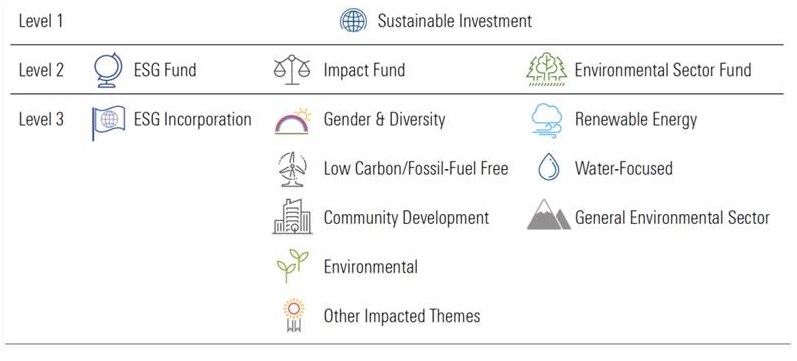
Growth in sustainable investing has not slowed down since the onset of the pandemic. But is all that money going to the ‘right’ place?
It depends on the investor. From concerns about COVID-19 to racial inequalities in North America, and climate change, motivations vary with values. But pairing these intentions with actions is getting increasingly difficult.
Growth in both assets and net flows into sustainable funds in Canada have helped spur a widening array of ‘sustainable’ fund choices. But like many things, more choices can often lead to more confusion.
Before choosing a sustainable investment, it is useful for investors to first understand why it is you are investing sustainably, and what the expectations are of the product that you invest in versus what the intention of the fund is. To help with this, readers are reminded that Morningstar uses a framework to identify sustainable funds. The framework hinges on an analysis of language within a fund’s prospectus, and looks like this:

The key point is this: not all sustainable funds are created equal. Simply relying on the term “ESG” to broadly capture all types of sustainable investments is the culprit of some of this confusion.
A commonly puzzling area around sustainable investments is in the investment of oil and gas companies. Let’s have a look at this through the lens of our framework:
- Recall that in the context of Morningstar’s sustainable attributes framework, “ESG funds” are those that actively assess the degree of ESG Risk (often through a third party provider like Morningstar Sustainalytics or others) as a key determining factor in what securities to buy and sell. This can be counterintuitive since ESG funds can in concept own companies in ‘unclean’ industries like oil and gas if the fund manager believes that the degree of ESG risk reveals an investment opportunity or is acceptable given the valuation of the company. Alternatively, the manager may purposely own a company with higher degrees of ESG Risk with the intent to engage with company management to lower this risk thereby increasing the intrinsic value of their position. In our framework, ESG funds don’t necessarily avoid specific sectors or industries. However, they are keenly aware of the amount of material financial risk inherent in their holdings associated with Environmental, Social, and Governance factors that are not prevalent in traditional financial metrics.
- On the other hand, “impact funds” are those that seek to make a measurable impact alongside financial return on specific issue areas through their investments. These funds often focus on specific themes and can focus on one or more of the Sustainable Development Goals outlined by the United Nations. If an impact fund is targeting fossil fuels, it is unlikely that it will invest directly in an oil and gas company.
- Environmental sector funds invest broadly in a theme like clean technology, for example. These types of funds will also tend to steer clear of oil and gas producers.
Our framework in identifying sustainable funds is not mutually exclusive. That is, a fund can use more than one approach. If you wish for your fund manager to go further than traditional financial metrics in picking companies, then consider an ESG fund. If you want to make a measurable difference in an area like greenhouse gas emissions, consider an impact fund. If you want to invest broadly in an area like clean technology, consider an environmental sector fund.
Until Canadian regulation catches up in helping investors identify sustainable products, investors are urged to do their own research by reading fund material carefully. That said, Morningstar’s framework is a great starting point to help narrow down the ever-growing list of choices.
This article does not constitute financial advice. It is always recommended to speak with a financial professional or and advisor before investing.










:quality(80)/cloudfront-us-east-1.images.arcpublishing.com/morningstar/54RIEB5NTVG73FNGCTH6TGQMWU.png)







